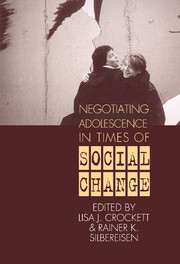Book contents
- Frontmatter
- Contents
- Contributors
- Preface
- 1 Social Change and Adolescent Development: Issues and Challenges
- Part I Models of Social Change Effects
- Part II Social Change and Adolescent Transitions
- 5 The Global Spread of Adolescent Culture
- 6 Social Change and the Sequencing of Developmental Transitions
- 7 German Unification and Adolescents' Developmental Timetables: Continuities and Discontinuities
- 8 Adolescents in Changing Social Structures: Bounded Agency in Life Course Perspective
- Part III Social Change and Adolescents' Social Contexts
- Part IV Implications of Social Change for Adolescent Health and Well-Being
- Part V Interventions: Promoting Healthy Development in Times of Social Change
- Endnotes
- Index
8 - Adolescents in Changing Social Structures: Bounded Agency in Life Course Perspective
Published online by Cambridge University Press: 26 January 2010
- Frontmatter
- Contents
- Contributors
- Preface
- 1 Social Change and Adolescent Development: Issues and Challenges
- Part I Models of Social Change Effects
- Part II Social Change and Adolescent Transitions
- 5 The Global Spread of Adolescent Culture
- 6 Social Change and the Sequencing of Developmental Transitions
- 7 German Unification and Adolescents' Developmental Timetables: Continuities and Discontinuities
- 8 Adolescents in Changing Social Structures: Bounded Agency in Life Course Perspective
- Part III Social Change and Adolescents' Social Contexts
- Part IV Implications of Social Change for Adolescent Health and Well-Being
- Part V Interventions: Promoting Healthy Development in Times of Social Change
- Endnotes
- Index
Summary
The intersection of social change and human lives represents a paradigmatic theme of sociology and the life course (Elder & O'Rand, 1994). The profound social changes of the 18th and 19th centuries, encompassing the rise of the metropolis and the spread of factories, inspired scientific inquiries into human communities and their many groupings (Lepenies, 1988; Mazlish, 1989). Especially in France, Germany, and England, scholars began to examine the implications of urban life and the industrial mode of production for personal identity. However, the role of the individual in most early theories of social change was notably minimal. As Giddens (1979) observed, these treatments viewed the individual as a “cultural dope,” the fully determined product of social forces that evolved independently of people. Thus, the city dweller invariably suffered from malaise, and the laborer of capitalism was necessarily alienated. Agency – in its broadest sense of something that causes something else – was located in the society' structural characteristics and normative dictates (Sztompka, 1993).
Such an orientation gradually came to include people as agents capable of constructing their lives. This theme became prominent with the widespread acceptance of dynamic models of individual development, as one finds, for example, in Piaget or Vygotsky (Bidell, 1988). Individuals proactively and reactively engage with challenges and resources, and these engagements often lead to the emergence and consolidation of new, adaptive capacities. In a life course framework, agency at the level of the person can be defined as the individual' capacity to formulate and pursue life plans. A central assumption of this definition is that agency extends across the phases of life, connecting earlier and later experiences with goals.
- Type
- Chapter
- Information
- Negotiating Adolescence in Times of Social Change , pp. 123 - 134Publisher: Cambridge University PressPrint publication year: 1999
- 12
- Cited by



